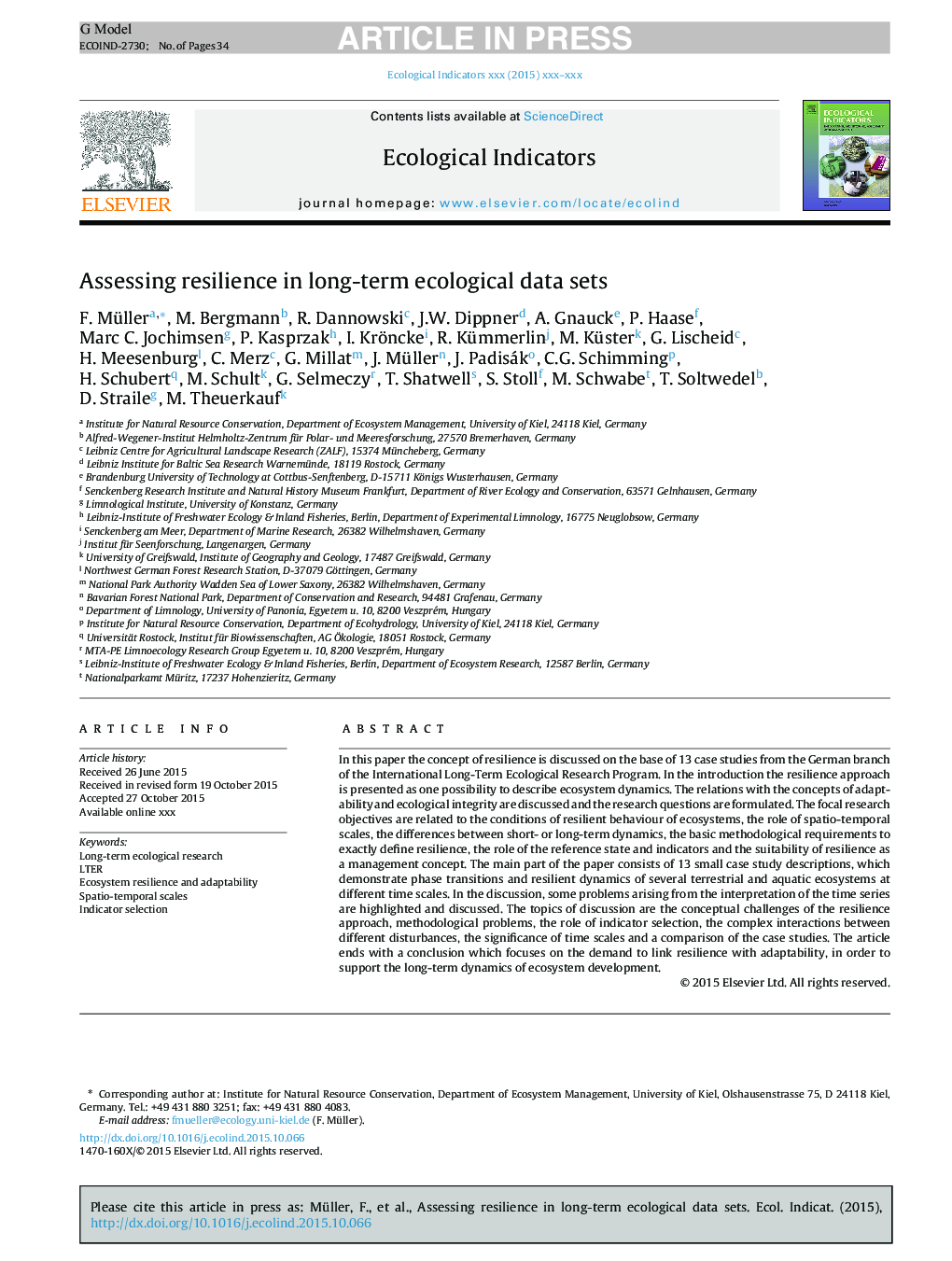| کد مقاله | کد نشریه | سال انتشار | مقاله انگلیسی | نسخه تمام متن |
|---|---|---|---|---|
| 6293336 | 1617137 | 2016 | 34 صفحه PDF | دانلود رایگان |
عنوان انگلیسی مقاله ISI
Assessing resilience in long-term ecological data sets
ترجمه فارسی عنوان
ارزیابی انعطاف پذیری در مجموعه داده های زیست محیطی درازمدت
دانلود مقاله + سفارش ترجمه
دانلود مقاله ISI انگلیسی
رایگان برای ایرانیان
کلمات کلیدی
ترجمه چکیده
در این مقاله، مفهوم انعطاف پذیری بر اساس 13 مورد مطالعه از شاخه آلمانی برنامه تحقیقات بین المللی بلند مدت بین المللی مورد بحث قرار گرفته است. در مقدمه، رویکرد انعطاف پذیری به عنوان یک امکان برای توصیف دینامیک اکوسیستم ارائه شده است. روابط با مفاهیم سازگاری و یکپارچگی زیست محیطی مورد بحث قرار گرفته و سوالات پژوهش فرموله شده است. اهداف تحقیق کانونی مربوط به شرایط رفتار انعطاف پذیر اکوسیستم ها، نقش مقیاس های فضایی و زمانی، تفاوت های بین دینامیک کوتاه مدت و درازمدت، الزامات روش شناختی پایه برای دقیق تعریف انعطاف پذیری، نقش دولت مرجع و شاخص ها و مناسب بودن انعطاف پذیری به عنوان یک مفهوم مدیریت. قسمت اصلی مقاله شامل 13 توصیف مطالعات موردی است که نشان می دهد انتقال فاز و پویایی انعطاف پذیر چندین اکوسیستم زمین و آبزی در مقیاس زمانی مختلف است. در بحث، برخی از مشکلات ناشی از تفسیر سری زمانی برجسته و مورد بحث قرار گرفته است. موضوعات بحث، چالش مفهومی رویکرد انعطاف پذیری، مشکلات روش شناختی، نقش انتخاب شاخص، تعامل پیچیده بین اختلالات مختلف، اهمیت مقیاس های زمانی و مقایسه مطالعات موردی است. مقاله با نتیجه گیری به پایان می رسد که متکی بر تقاضا برای تسریع انعطاف پذیری با سازگاری، به منظور حمایت از دینامیک بلند مدت توسعه اکوسیستم است.
موضوعات مرتبط
علوم زیستی و بیوفناوری
علوم کشاورزی و بیولوژیک
بوم شناسی، تکامل، رفتار و سامانه شناسی
چکیده انگلیسی
In this paper the concept of resilience is discussed on the base of 13 case studies from the German branch of the International Long-Term Ecological Research Program. In the introduction the resilience approach is presented as one possibility to describe ecosystem dynamics. The relations with the concepts of adaptability and ecological integrity are discussed and the research questions are formulated. The focal research objectives are related to the conditions of resilient behaviour of ecosystems, the role of spatio-temporal scales, the differences between short- or long-term dynamics, the basic methodological requirements to exactly define resilience, the role of the reference state and indicators and the suitability of resilience as a management concept. The main part of the paper consists of 13 small case study descriptions, which demonstrate phase transitions and resilient dynamics of several terrestrial and aquatic ecosystems at different time scales. In the discussion, some problems arising from the interpretation of the time series are highlighted and discussed. The topics of discussion are the conceptual challenges of the resilience approach, methodological problems, the role of indicator selection, the complex interactions between different disturbances, the significance of time scales and a comparison of the case studies. The article ends with a conclusion which focuses on the demand to link resilience with adaptability, in order to support the long-term dynamics of ecosystem development.
ناشر
Database: Elsevier - ScienceDirect (ساینس دایرکت)
Journal: Ecological Indicators - Volume 65, June 2016, Pages 10-43
Journal: Ecological Indicators - Volume 65, June 2016, Pages 10-43
نویسندگان
F. Müller, M. Bergmann, R. Dannowski, J.W. Dippner, A. Gnauck, P. Haase, Marc C. Jochimsen, P. Kasprzak, I. Kröncke, R. Kümmerlin, M. Küster, G. Lischeid, H. Meesenburg, C. Merz, G. Millat, J. Müller, J. Padisák, C.G. Schimming, M. Theuerkauf,
